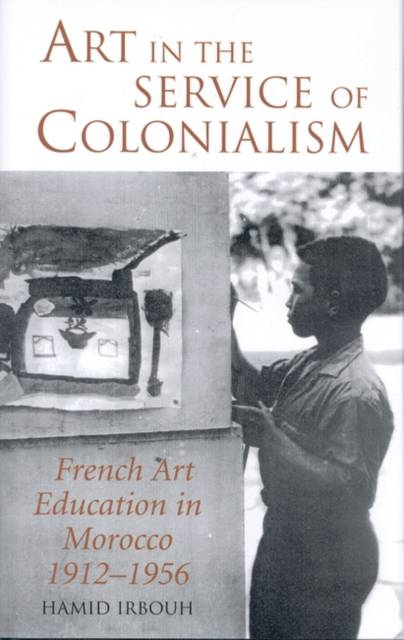
- Retrait gratuit dans votre magasin Club
- 7.000.000 titres dans notre catalogue
- Payer en toute sécurité
- Toujours un magasin près de chez vous
- Retrait gratuit dans votre magasin Club
- 7.000.0000 titres dans notre catalogue
- Payer en toute sécurité
- Toujours un magasin près de chez vous
Description
"Art in the Service of Colonialism" throws new light on how nothing in the Moroccan French Protectorate (1912-1956) escaped the imprints of metropolitan ideology and how the French transformed and dominated Moroccan society by looking at how the arts and crafts were transformed in the colonial period. Hamid Irbouh argues that during the Moroccan Protectorate (1912-1956), the French imposed their domination through a systematic modernisation and regulation of local arts and crafts. They also stewarded Moroccans into industrial life by establishing vocational and fine arts schools. The French archives, Arabic sources, and oral testimonies, which Irbouh used, demonstrate complex relationships between colonial administrators of both genders and their interactions with Moroccan officials, notables, and the poor. The French co-opted some locals into joining these educational institutions, which respected and reinforced familiar pre-Protectorate social structures. The artisans become The Best Workers in the French Empire, and artists exhibited abroad and cultivated a European and American clientele.
The contradictions between reformist goals and the old order, nevertheless, added to social dislocations and led to rebellion against French hegemony. Irbouh focuses on how French women infiltrated the feminine Moroccan milieu to buttress colonial ideology, and how, at critical moments, Moroccan women and their daughters rejected traditional passive roles and sabotaged colonial plans. France's legacy in Moroccan arts and crafts provoked a backlash in the postcolonial period. After independence local artists, searching for their own identities, sought to reclaim their authenticity. The struggle to define a pristine visual heritage still rages, and the author, by underlining French contributions to Moroccan artistic and craft production, challenges the conclusions of the artists and critics who have argued for the establishment of an unadulterated art devoid of most or even all foreign influences. As in so many areas of Moroccan society, this book reveals that the weight of colonial history remains heavily present.
In this well-conceived book based on original archival sources Hamid Irbouh investigates how French colonial administrators employed French women to inculcate colonial ideology by establishing new craft schools for notable and poor families in Moroccan cities. The French intended not only to teach modernized versions of old Moroccan crafts, but also wanted to instill new work habits and modern concepts of time into the girls and young women who attended their schools. Dr. Irbouh demonstrates how French women administrators took the lead in this effort and also shows how Moroccan women absorbed their lessons, but also resisted the colonial enterprise. His is a novel approach to colonial art history, situating Moroccan art production in large social, political and ideological contexts.
Spécifications
Parties prenantes
- Auteur(s) :
- Editeur:
Contenu
- Nombre de pages :
- 296
- Langue:
- Anglais
- Collection :
- Tome:
- n° 2
Caractéristiques
- EAN:
- 9781850438519
- Date de parution :
- 01-05-05
- Format:
- Livre relié
- Format numérique:
- Genaaid
- Dimensions :
- 140 mm x 216 mm
- Poids :
- 489 g

Les avis
Nous publions uniquement les avis qui respectent les conditions requises. Consultez nos conditions pour les avis.






